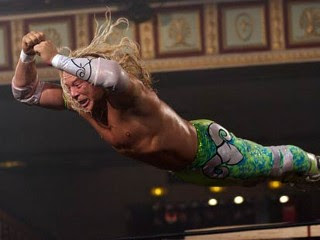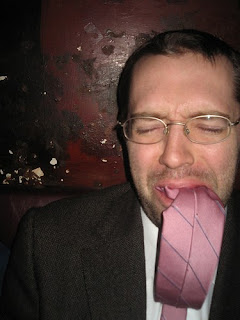
For a Christmas special, I'm bringing a long-dormant film review. I've seen two in theaters lately: Slumdog Millionaire and The Wrestler. I'll start with the former.
SM is a fun movie to watch. It's got just the right amount of comedy (regular enough so that the last laugh is still fresh in your mind when the next one hits, but not so much that you feel like you're just watching a "comedy") and just the right amount of suspense (so you are always wanting to know what's happening next, as in a good page-turning book). It almost goes too far in the schmaltzy department, and as I saw it, there were some acting deficiencies, but in some ways, that's the point.
This movie is very Indian-centric, from the very numerous and specific details of poor Indian life to the heavily accented speakers, to the liberal use of what must be Indian slang. As such, it can't help but to deal with Western assumptions regarding the well-known Bollywood movies. As with the ending, when all the characters spontaneously launched into an aggressively choreographed dance number, at times the director Danny Boyle chose to directly embrace the Indian movie-stereotype. I think this was a smart choice, as it had the effect of recalling the artistically bankrupt Bollywood films as an easy way to make clear that SM is anything but.
The story of Slumdog Millionaire is perfect, basically. Use the structure of a foreign version of "Who Wants to Be a Millionaire?" as a frame for flashbacks telling the story of a person's life, all while borrowing the constant escalation of suspense that's endemic of the show. Even during the movie I caught myself thinking, "Jeez this is a great idea for a storyline." And there's not much more to say about it: a great idea is a great idea.
Unfortunately, the actors responsible for bringing the great story to life didn't quite equal their material, with one very notable exception. First, I want to make clear that this was a very nicely done movie, so the acting being a detriment isn't as harsh as it would be if we were talking about a Martin Lawrence movie. Nonetheless, the lead male actor, in a role that was ripe for the taking, was pretty underwhelming. Passable and often likable, but underwhelming. I can't even say as much about the adult lead female role or the adult brother, both of whom were very close to being distractingly eptless.
Now, let's get to the exception: Anil Kapoor, Bollywood veteran. He plays the Regis Philbin role as game show host and dominates every scene just exactly as much as you'd want him to. Midway through the movie, I found my laughing just at his intoxicatingly flamboyant pronunciation of the word "millionaire," as well as silently hoping he'd be in every scene. I'll call it a Roberto Benigni performance, after Benigni's comic but appropriate dominance of Down By Law. He doesn't distract from the story or the other characters, but he steals every scene. I was impressed. Even if Mr Kapoor is no Brando, he is sure a professional actor.
Bottom line on this movie: well-done, time well spent. It won't probably win any awards but it doesn't need to.
Now, after taking longer than I expected with that, let me get to the reason I decided to write today: The Wrestler. It's been 3 days now since I've seen it, and it's effect on me is actually still growing. Leaving the theater, I felt moved by it: physically and emotionally, but its overall impact as a piece of art hadn't fully sunk in. It's that brilliantly subtle (and let me say for the record that "brilliantly subtle" is something for which I have a weakness). I'm going to go ahead and say that in these past three days, The Wrestler has for me transformed from simply "good 2008 film," to "hopefully an Oscar-winning film," to simply "great film regardless of year."
If you're going to see this film, please do yourself a favor and spend thirty minutes googling its star, Mickey Rourke. His personal story and the story within the film are impossibly tied together. I can't imagine having a full appreciation for his work here without knowing much beforehand about him.
So how about Mickey Rourke? I've done myself the favor of steering mostly clear of this stuff, but he's been getting some good press lately. Of course, it's easy for people to get carried away with that, so you never know. I purposefully chose not to too closely analyze Rourke while watching, so I would get a better feel for the film as a whole and not have any preconceived notions about what I was seeing or not seeing with him. Well, let me report that after some consideration, he's as good as advertised.
Not all great acting performances were created alike. Some are like Daniel Day-Lewis in There Will Be Blood. Others are like Marlon Brando in Last Tango in Paris. Mickey Rourke here is definitely not at all like the former, though perhaps not quite so much like the latter. He obviously carries this film but he doesn't knock you over the head about it. He's subtle. He's real. He's exactly what's required to be perfect for The Wrestler.
The scene where he's working at the deli for the first time--and enjoying it (there is another, more ominous one)-- is so good and so simple and so perfect that it almost tricked me into thinking it was just an average effort in just an average scene. (Does that even make sense? I don't know. I'll lazily say you just have to see it to understand.) The scene when he's playing Nintendo with the kid, the ones early on where he's getting ready for a match, the ones with his daughter that were almost begging to be overacted, and the wonderful speech before his last match--practically every scene is the best scene. That's exactly why it's easy to simply appreciate the performance in real time but wonder at it as it sinks in afterward.
I can't help but wonder what it was like on the set of this film, with Rourke lumbering around being amazing. Was it lighthearted and fun, so as to cut the emotional tension of the film, or was it incredibly intense, so as not to disrupt the possibly Method techniques of the star or the definitely meta dynamics of same? If you're the director do you treat Rourke like a pitcher working on a no-hitter (silence and distance), or like a guy who just hit a walk-off homer (enthusiasm and loud positive reinforcement). Whatever Darren Aronofsky did, it worked.
The most interesting thing about this acting job is: where could Mickey Rourke possibly go from here? does he start getting intense parts again? (Cause you know he could never honestly do anything at all light at this point.) Or should he just suffer a tragic death or retirement, so this role can be raised up and our memory of it never tampered? (I say no. The possibilities are too endlessly interesting that I selfishly want to see what happens.)
Back to the film as a whole now. It's lazy and cliche to say it's shot in a documentary-style, but if I were to say that, you would know exactly what to expect. The fact is that it is not shot that way; it is clearly a staged production. It's the lighting (lack thereof) and the settings (Jersey shitlands) that make it so gritty. I think this is a good time to mention that these were choices made by Aronofsky that--like whatever his approach to Rourke was--worked beautifully for this film. They don't result in pretty cinematography or fancy directorial stamps, and they don't probably result in lavish accolades, but they go a long way to making a great film. So good work to him. (Disclaimer: I am a sucker for a lot of those big director moves and camerawork. It's nice to take time acknowledge that it doesn't have to be that way to be effective.)
The last thing I'd like to mention is the ending. (Spoilers, obviously.) A film like this one needed to have a good ending. We got a nice snapshot of a time in the character's life, so the story didn't necessarily need to be wrapped up neatly or anything, but the film itself needed to go out on a high note. As with the other things I've talked about, here The Wrestler was superb.
The film is about a man struggling to move on with his life, about a wrestler trying to learn that it's ok not to be a wrestler anymore, to accept that his essence is directly harmful to himself. (This is interesting of course, and lends itself perfectly to a film.) Randy the Ram has some success in this endeavor: strangely enjoying his deli clerk job, making progress with his dancer-lady, finally connecting with his daughter, doing coke and banging a young ho (he, kidding on that last one); but of course he cracks and is forced to heed the siren call of himself. He's a wrestler. He's a failure. He's a deadbeat. If his heart explodes, then so be it, cause if he can't be hmself then what sense is there in being.
When he steps in the ring at the end, post-heart attack, the sense of doom is palpable. This is why his speech just prior is so incredible and oddly triumphant. And all the horrible things we've been forced to see inside the ring leading up to this final match set the stage wonderfully. That there is no real brutality is of no consequence, because we are constantly expecting it. It's almost hold-your-breath uncomfortable.
I think a lot of people will view the ending as sad, when Randy appears in the onset of another heart attack but still climbs the top ropes and launches himself off in his trademark "Ram Jam," but I feel very differently. As I hinted before, I think it's great that Randy has tried to change himself, but ultimately realized he is who he is. To quote my most favorite movie of the last several years: "You can't change what's coming." If he's going to go out, he's going out on his own terms doing what he loves to do. Standing on the top ropes hearing the cheers of the crowd, he very literally and figuratively went out on top. Good for him. And good for The Wrestler. A perfect ending to a great film.


No comments:
Post a Comment